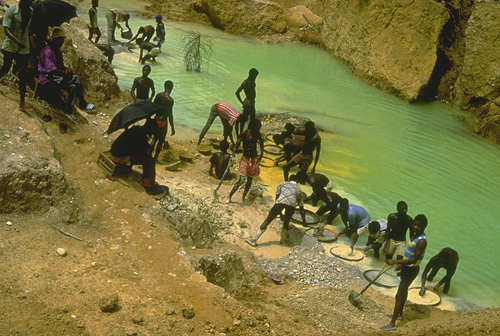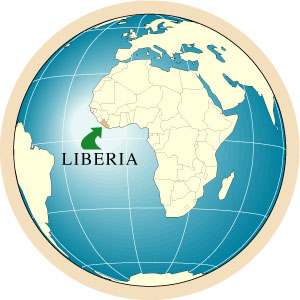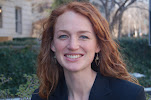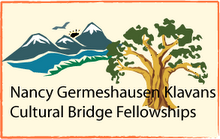Until very recently, Liberians were fleeing the instability of their embattled country in droves. Over the course of the 14 year civil war, half a million Liberians took refuge in neighboring countries like Guinea, Ghana, and Sierra Leone, many in overcrowded refugee camps. Those with the means (or a fortuitous stroke of luck) made a beeline for the United States, establishing a highly educated and professional Liberian diaspora in American states like Maryland and Virginia that, ironically, bear the same names etched on Liberia’s map 150 years ago by the freed American slaves who arrived on Liberia’s shores.
President Sirleaf’s election in 2005 immediately halted this hemorrhage, and has even begun to turn the tide in the opposite direction. Displaced Liberians, returning in mass from refugee camps, have swelled Monrovia’s population and have begun to piece together the remnants of their previous life. Strikingly, President Sirleaf has also inspired a dramatic reverse brain drain. Drawn by personal invitations from the President and a soaring optimism in the country’s direction under her leadership, Liberians living abroad are now coming home, bringing with them decades of professional experience, impressive diplomas, and an often zealous commitment to moving Liberia forward and to regaining the country’s lost ground.
The presence of returned Liberians from the United States is unmistakable. Take President Sirleaf’s administration. The vast majority of Cabinet ministers have just spent upwards of 20 to 30 years in the US. In fact, it is a rare occurrence indeed to find a senior-level decision maker who wasn’t in the US during the war. (A very notable exception is the Minister of Health, a US-educated Liberian doctor who spent 30 uninterrupted years running Liberia’s largest hospital outside of Monrovia, forgoing lucrative medical positions abroad and braving dangerous fighting to keep the country’s medical lifeline going). Returned Liberians are opening banks, revamping entire industries, deftly administering government ministries, and bringing new ideas and urgently needed investment.
A mission to give back
When I’ve asked these returned Liberians why they have come home, I invariably hear the same answer: “Because the President asked me to.” This response appears to be equally about the President herself –- and the reverence, admiration, and loyalty that she inspires in people – as it is about a patriotic duty to public service at such a watershed moment in Liberia’s history. The President’s extensive Rolodex, developed through her many years working abroad, enabled her to tap many of the diaspora’s best and brightest for influential positions within and outside the Government. And while it is difficult for anyone to say no to this “Iron Lady” President, the affirmative response to her invitation was to a large degree an expression of a sincere desire to make a difference.
Ben, a 42 year old Liberian who was educated at Virginia Tech and left a successful technology career outside Washington, DC to resuscitate (at the President’s request) Liberia’s struggling state-owned telecommunications company, explained this sentiment to me: “Many of us who were fortunate enough to live in the United States have, through a great deal of hard work, achieved success in a traditional sense. We attended good universities, went on to impressive jobs, made money, bought a house, and did well for ourselves. And then at some point we asked, ‘Now what?’ What we’re searching for now is something bigger than this material success, some way to contribute to a larger picture. That’s why so many of us have come home to Liberia: to give back.”

Yesenia, Emily, Yue Man and I with Mary, a recently returned Liberian who is tackling corruption in the passport office.
Coming home is not easy, nor is it without sacrifice. Public sector salaries in Liberia are a pittance compared to the compensation that is commanded in the United States. And after 20 years abroad, many overseas Liberians face such financial realities as mortgages and expensive college tuition bills, not to mention a vastly higher standard of living. To overcome the financial hurdles to returning home, several inventive donor-funded programs have been implemented to help cross the financial t’s and dot the salary i’s of seasoned professionals who accept low paying jobs in the capacity-strapped Liberian public sector. While these supplemented salaries are still often a third or less of US salaries, they go a long way towards narrowing the gap between good intentions and financial reality.
In discussions of challenges they face, returned Liberians frequently cite culture shock, difficult living conditions, severe limitations in the skills of their staff, and the deep frustrations that arise when high expectations clash with reality. It is increasingly clear that the challenge of rebuilding Liberia amounts to a long gruelling marathon, and not a high octane sprint. One of the key challenges facing the returned diaspora then is to sustain their commitment and energy after mile 1, when the initial euphoria has worn off and the road ahead stretches on another trying 25 miles.
A binding constraint to Liberia’s development
The return of Liberians like Ben is more than just inspiring. Some would even argue that it is crucial for Liberia’s development. More than any other obstacle – crappy roads, low foreign investment, a feeble budget, annihilated infrastructure, crushing unemployment --- weak human capacity is one of the most central, if not the central, binding constraint to Liberia’s development in the next decade and beyond. Of course, “human capacity constraint” is a pleasant sounding euphemism that encompasses a range of damning shortcomings that boil down to individuals’ skills, motivation, and capabilities. Two decades of war had the effect of hitting a national pause button in Liberia. Education was almost entirely disrupted, which meant that no lawyers, doctors, nurses, teachers, judges, technicians, or engineers were trained. A whole generation reached their productive years without developing skills and with little hope of actually being productive. Liberia’s entire economy came to a screeching halt during the war, gradually eroding people’s work ethic and initiative and fuelling a pervasive culture of petty corruption that continues today. For those who were educated or skilled before the war, these same endowments that are now so desperately needed in Liberia were the ticket to people getting out of Liberia. This has left the country today with a gaping hole of middle managers and qualified staff at all but the very top levels.
To understand the impact of this human capacity constraint, consider for instance the impossibility of building an effective judicial system without enough lawyers and judges and with an under-trained staff that can take months to process claims. What are the prospects that war criminals will actually be persecuted, that women will be able turn to legal protection against widespread rape, or that nervous investors will trust that their property would be legally protected? Or the difficulty in educating Liberia’s children when less than half of school teachers have any formal training (or, in some cases, education!). Or of getting anything done efficiently when civil servants have little experience with the sort of follow through, computer skills and productivity that underpin any effective administrative apparatus.
This last point may sound harmless, but I can attest from personal experience that it is a very, very serious challenge. Case in point: the hellish 18 hour day I endured on Thursday, during which I worked with some 7 government ministries and managed several staff to collect and analyze data for two Cabinet presentations reviewing the fiscal year and poverty reduction deliverables. What should have been an exceedingly simple and straightforward missive proved to be, in very crude terms, a “cluster f*ck.” Halfway through the day I unleashed a militant micromanager that I never before knew existed (and who I hope never rears her scary head again!) and began to pray for the gray clouds overhead to rain down follow-through and initiative all over downtown Monrovia. By 1:30 AM, through a super-human effort, I finally had two Power Point presentations, an updated matrix, a growing ulcer, and a renewed appreciation for everything I just wrote in this blog entry.
No matter what name you give it – institutions, governance, human capital – there is little question that the availability of effective, skilled people is essential to Liberian’s Herculean task of fixing the country’s governance architecture and implementing the ambitious development agenda. Since human capital cannot be developed instantly overnight, a crucial stopgap measure is the immediate infusion of people like Ben.
Exacerbating historical inequalities
And yet, despite the many benefits associated with these measures, they also raise some troubling concerns, first and foremost about inequality. Inequality has been one of the most salient features in Liberia throughout the country’s history. Since the first ships of freed American slaves arrived on Liberia’s shores nearly two centuries ago, the inequality between the native population and these Americo-Liberians -- in everything from wealth to power to education -- has been immense. Making up only 5% of the country’s population, the freed American slaves and their descendents maintained an exclusive monopoly over the country’s wealth and power structure. Little effort was made to raise the living standards of the native population, who were even subjected to forms of slavery. Despite the success of decades of Americo-Liberian elite rule in creating a high profile for Liberia within Africa and in sustaining strong economic growth rates, the native population exercised little power during this time and enjoyed few benefits from the country’s gains.
Resentful of these age-old inequities, most Liberians jubilantly rejoiced in 1980 when Samuel K. Doe, a 29 year old uneducated military sergeant, overthrew (and killed) then Americo-Liberian President Tolbert to become the very first ever native leader of Liberia. Samuel Doe proved to be the foil of today’s technocratic President Sirleaf. When asked by international reporters what economic policies he would pursue in office, he stared blankly at the camera, with his mother by his side, and nervously answered “the same.” History proved this timid response wrong: the economy took a nose dive throughout Doe’s corrupt and inept ten year rule. As a result, the same people who celebrated his ascension fell deeper into poverty, and the country ultimately unfolded into civil war.

Samuel K. Doe
Twenty five years later, the country’s leadership has once again undergone a coup, albeit through democratic means. Reacting this time to decades of egregious corruption and conflict, the majority of Liberians in 2005 caste their votes for a leader who represented integrity and competence, as opposed to ethnic affiliation. Yet the lessons from Doe’s rise simply cannot be ignored, particularly as the return of overseas Liberians threatens to exacerbate the country’s inequality: this time, enlarging the gulf between those (mostly native) Liberians that remained during the war and suffered, and those whose privilege enabled them to seek refuge in the United States and leap to a new standard of living. Now home in Liberia, the returned Liberians form an even more elite class than ever before seen in the country’s history. The elite circle of Americo-Liberians-returned-from-America --- brandishing impressive (and often intimidating) credentials from US universities and companies, residing in Monrovia’s choice real estate , and wielding a disproportionate influence in the highest echelons of government -- contrast wildly with their fellow citizens, who earn on average 30 cents a day and, if lucky, live in an even remotely permanent shelter.
To be sure, this elite class is different than its predecessors. By and large, their wealth was not gained through plundering (as was the case with the corrupt rulers of the past thirty years who withdrew from the Central Bank like a personal bank account), and the commitment of the Government to poverty reduction and development for all people is unshakeable. Still, concerns arise. In a country as poor as Liberia -- where unemployment stands at 85% and the private sector is barely functioning -- government positions are the be all and end all: the highest forms of influence, the best paid positions, the most prestigious, the way someone “arrives” economically, politically, and socially. Restricting access to an elite circle of skilled returned Liberians may well maximize the Government’s effectiveness, but at the cost of excluding native citizens and fostering potentially destabilizing resentment, whose cost may again prove fatal.
In my conversations with my Liberian co-workers – secretaries, drivers, administrative assistants – I have been very impressed by the genuinely welcoming attitude that many have expressed towards the returned Liberians, and of their earnest desire to learn from them. The concerns that have aired in these conversations, however, include the condescension that they feel is often directed at them, the lack of respect, and the perception that skilled locals are often overlooked in favor of expatriate Liberians. A lingering challenge that I, too, face is to be patient and understanding, and to find ways to respectfully empower my colleagues and help close the capacity gap.
Ultimately, it is my hope that the differences that divide Liberians will be dwarfed by the power of what brings Liberians from all ethnic and class divisions together: a deep desire for a better future for Liberia. President Sirleaf has proven remarkably skilled at attracting people home, and she now faces the task of drawing her disparate people together, whether they be former rebel leaders, educated telecommunications experts, or rural families struggling to put rice on the table. The President herself has proven an adept chameleon: switching from “simple English” with a thick Liberian accent to a technocratic speech depending on her audience, and wearing hats ranging from courageous opposition leader to international role model.
Today in Liberia, with the landscape of “home” quite literally transformed by war, Madam President faces the challenge and opportunity of reshaping her home, Liberia, in a more equitable, just image. It is in this endeavor that I, too, give her my vote.
 The women of the Ministry of Finance: me, Dabah Varpilah, Minister Antoinette Sayeh, Elfreda Tamba, Aletha Brown, and Angelique Weeks
The women of the Ministry of Finance: me, Dabah Varpilah, Minister Antoinette Sayeh, Elfreda Tamba, Aletha Brown, and Angelique Weeks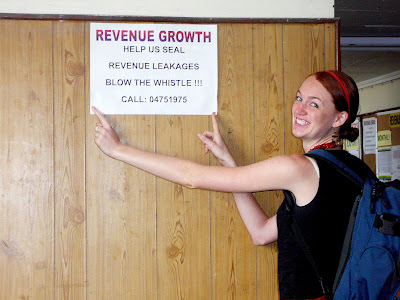 Absurdly dorky picture of me with Revenue Growth sign. Negative five points for posting a geeky photo of myself on a blog; plus two points for finding any photo whatsoever that illustrates revenue growth.
Absurdly dorky picture of me with Revenue Growth sign. Negative five points for posting a geeky photo of myself on a blog; plus two points for finding any photo whatsoever that illustrates revenue growth.



